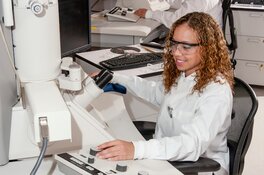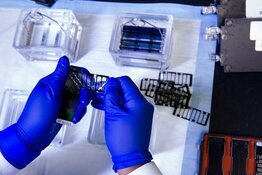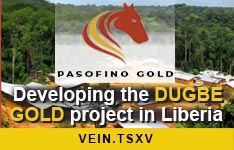Rakovina Therapeutics Inc. (RKV:TSX.V), a biopharmaceutical company based in Vancouver, has underscored the strategic value of its Scientific Advisory Board (SAB), which plays a key role in guiding the company's artificial intelligence (AI)-enabled oncology drug development. The SAB includes internationally recognized experts with extensive experience in oncology, clinical development, and AI-driven drug discovery.
The board is chaired by Dr. Dennis Brown, a veteran of more than 35 years in cancer drug discovery who has founded several biotech firms including Matrix Pharmaceuticals and Kintara Therapeutics. Dr. Artem Cherkasov, a professor at the University of British Columbia (UBC), is recognized for developing the Deep Docking™ AI platform, which helped facilitate a US$142 million licensing deal with Roche. Dr. Petra Hamerlik, formerly of AstraZeneca and now Chair of Translational Neuro-Oncology at the University of Manchester, brings deep expertise in brain tumor therapeutics.
The SAB also includes Dr. Leonard Post, who previously served as Chief Scientific Officer at BioMarin and played a pivotal role in the development of talazoparib, a PARP inhibitor now commercialized by Pfizer. Dr. Neil Sankar brings experience from senior clinical development roles at Genentech, MedImmune, and Pharmacyclics, having contributed to U.S. Food and Drug Administration filings for Kadcyla and Ibrutinib. Dr. Wang Shen, the inventor of Rakovina's KT‑2000 and KT‑3000 drug candidate series, is also known for co-inventing the FDA-approved drug Lifitegrast and contributing to the development of Venetoclax.
"Our SAB members have collectively developed and licensed numerous therapies across the cancer treatment spectrum," said Jeffrey Bacha, Executive Chairman of Rakovina, in the announcement. "Their expertise is instrumental in advancing our DNA-damage response (DDR) pipeline toward key preclinical and clinical milestones."
Rakovina's development approach integrates AI algorithms, such as Deep Docking™ and Variational AI's Enki™ platform, with in-house wet-lab validation conducted in collaboration with UBC. This workflow enables the company to rapidly screen billions of compounds for effectiveness against DDR-related cancer targets, a pathway present in approximately 75% of solid tumors. According to the company, this integration significantly reduces the time and cost required for drug development when compared to traditional methods.
Artificial Intelligence Reshapes Oncology Diagnostics and Decision-Making
The use of artificial intelligence (AI) in oncology has continued to expand in both research and clinical applications, offering new methods to support faster, more personalized treatment decisions and optimize drug development strategies. On July 5, Oncology published an article by Julie M. Vose, MD, MBA, outlining how AI was being rapidly integrated into cancer detection, diagnosis, treatment selection, and clinical trial matching.
Vose noted that AI-assisted models such as CHIEF, which was trained on 15 million unlabeled histopathology images, achieved "96% accuracy across multiple cancer subtypes" in test datasets. She explained that tumor molecular profiling and DNA sequencing were often slow processes and that AI's ability to predict tumor biology in advance of these results could "direct the optimal therapy."
Vose also described how AI was supporting physicians by simplifying patient summaries and prescreening candidates for clinical trials, improving workflow, and reducing administrative burdens. However, she emphasized that "data sharing and privacy" remained major barriers to broader implementation, with federated learning and centralized legal frameworks being explored to address these challenges.
In a study published in Nature Medicine and highlighted by The Mount Sinai Hospital on July 9, researchers demonstrated that AI could identify EGFR gene mutations in lung adenocarcinoma using routine pathology slides. This finding suggested that certain rapid genetic tests could be reduced or avoided, preserving limited tissue samples for more comprehensive sequencing.
"Our findings show that AI can extract critical genetic insights directly from routine pathology slides," said lead author Gabriele Campanella, PhD, from the Icahn School of Medicine at Mount Sinai. In a real-time trial at Memorial Sloan Kettering Cancer Center, AI predictions were run in parallel with clinician workflows and achieved reliable results, indicating that such models could flag actionable mutations while conserving lab resources. Alexander Charney, MD, PhD, stated, "The real promise lies not only in efficiency, but in the future potential to uncover new biomarkers from routine pathology slides."
On July 10, The American Journal of Managed Care featured a panel discussion from Tennessee Oncology's "Tech Innovations in Community Oncology" forum, focusing on how AI was shaping treatment decisions and workforce training. Moderator Casey Chollet-Lipscomb, MD, FASTRO, asked oncologists Lalan Wilfong, MD, and Ravi Parikh, MD, MPP, FACP, about AI's role in practice. Wilfong said, "I could totally see using AI in the future to take all of the clinical information that I've gotten, making sure I didn't miss anything."
He indicated that AI could reduce the time required for research, allowing more time for decision-making. Parikh emphasized the need for predictive, not just prognostic, biomarkers, explaining, "Can I use AI to make a decision about which therapy to use, compared to what I would do if I didn't use AI?" He warned that many AI tools offered limited clinical value because they presented abstract probabilities instead of actionable recommendations.
Wilfong and Parikh also discussed challenges related to toxicity prediction and real-world data quality. Parikh noted that clinical trials often failed to report lower-grade toxicities, limiting the data available to train AI models. He stated, "Forget about trying to train an AI based on real-world toxicity data, because we don't know how to collect toxicity data in the real world." Despite these limitations, the panel agreed that AI held meaningful promise, especially if physicians were trained to question and verify AI-generated conclusions using their clinical judgment.
Advancing Precision Oncology Through Strategic Expertise
The company's investor materials describe several milestones that are expected to benefit from the SAB's guidance and the integrated AI-lab workflow. Rakovina is currently advancing multiple preclinical programs, including its kt-2000 series (PARP-1 inhibitors) and kt-5000 series (ATR inhibitors), which are being optimized for brain penetration and improved selectivity. A third program, kt-3283, is focused on PARP-resistant adult and childhood cancers.
Rakovina has also indicated it intends to present validation data for its next-generation PARP and ATR inhibitors at upcoming conferences such as the American Association of Cancer Research meeting co-organized with the National Cancer Institute and European Organization for Research and Treatment of Cancer (AACR-NCI-EORTC) and the Society for Neuro-Oncology (SNO), according to the Q3 2025 investor presentation. Additionally, interim data on pharmacology and pharmacokinetics for ATR inhibitors is anticipated within the same timeframe.
The company continues to explore potential development collaborations for its kt-3283 compound and is in ongoing discussions for co-development and licensing partnerships related to its kt-2000 series. These efforts are supported by the SAB's extensive experience in structuring and executing high-value partnerships across the pharmaceutical industry.
Rakovina maintains exclusive access to its AI screening platforms for DDR targets, which, combined with its in-house validation infrastructure, position the company to accelerate the development of DDR-targeting cancer therapies. As stated in the investor presentation, Rakovina believes this integrated approach distinguishes it within the AI-enabled oncology sector.
Analysts Highlight AI Platform and Key Catalysts
On April 2, analysts Alexander Rihane and Christian Orquera of First Berlin Equity Research initiated gave Rakovina Therapeutics a Buy rating and a target price of CA$0.40 per share. The analysts highlighted the company's Deep Docking AI platform, referencing its prior real-world application during the COVID-19 pandemic, where it generated 1,000 candidate compounds in less than four weeks. One of these compounds later became the active ingredient in Paxlovid. The report also pointed to upcoming milestones, including the presentation of validation data for AI-derived compounds at the American Association for Cancer Research (AACR) Annual Meeting in late April. The valuation was derived from a sum-of-the-parts model using a risk-adjusted net present value of the company's lead assets, with the target price implying a 300% increase from the CA$0.10 share price at the time of the report.
On June 6, Dr. Douglas Loe of Leede Financial Inc. published additional commentary following Rakovina's first-quarter 2025 financial results. In his weekly review, he stated that Rakovina's CA$4 million equity financing was nearing completion and projected that pro forma cash levels would likely exceed the CA$100,000 reported at the quarter's end.
 Streetwise Ownership Overview*
Streetwise Ownership Overview*
Rakovina Therapeutics Inc. (RKV:TSX.V)
Loe noted that the company's CA$900,000 research and development spending aligned with its AI-driven drug discovery program, conducted in collaboration with the University of British Columbia and Variational AI. He also observed that Rakovina continued efforts to identify small molecules with dual inhibitory activity targeting PARP1 or PARP2 and DNA repair pathways such as ATR, which he said was consistent with strategies seen in other Phase 2 cancer drug development programs.
Ownership and Share Structure
Edison Oncology owns 12% of Rakovina Therapeutics.
Management and Reporting Insiders own 4%, with the top two being Jeffrey Bacha and Alfredo De Lucrezia.
The rest is friends/family and retail.
Rakovina Therapeutics recently announced a 10:1 share consolidation, effective on June 24, 2025. This means that for every 10 pre-consolidation common shares, shareholders now hold one post-consolidation common share. Rakovina Therapeutics Inc. has more than 140 million shares outstanding and a market capitalization of approximately CA$7.03 million. Over the past 52 weeks, its stock has traded between CA$0.23 and CA$0.05.
| Want to be the first to know about interesting Biotechnology / Pharmaceuticals investment ideas? Sign up to receive the FREE Streetwise Reports' newsletter. | Subscribe |
Important Disclosures:
- Rakovina Therapeutics has a consulting relationship with Street Smart an affiliate of Streetwise Reports. Street Smart Clients pay a monthly consulting fee between US$8,000 and US$20,000.
- As of the date of this article, officers and/or employees of Streetwise Reports LLC (including members of their household) own securities of Rakovina Therapeutics.
- James Guttman wrote this article for Streetwise Reports LLC and provides services to Streetwise Reports as an employee.
- This article does not constitute investment advice and is not a solicitation for any investment. Streetwise Reports does not render general or specific investment advice and the information on Streetwise Reports should not be considered a recommendation to buy or sell any security. Each reader is encouraged to consult with his or her personal financial adviser and perform their own comprehensive investment research. By opening this page, each reader accepts and agrees to Streetwise Reports' terms of use and full legal disclaimer. Streetwise Reports does not endorse or recommend the business, products, services or securities of any company.
- This article does not constitute medical advice. Officers, employees and contributors to Streetwise Reports are not licensed medical professionals. Readers should always contact their healthcare professionals for medical advice.
For additional disclosures, please click here.






































